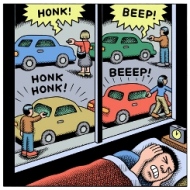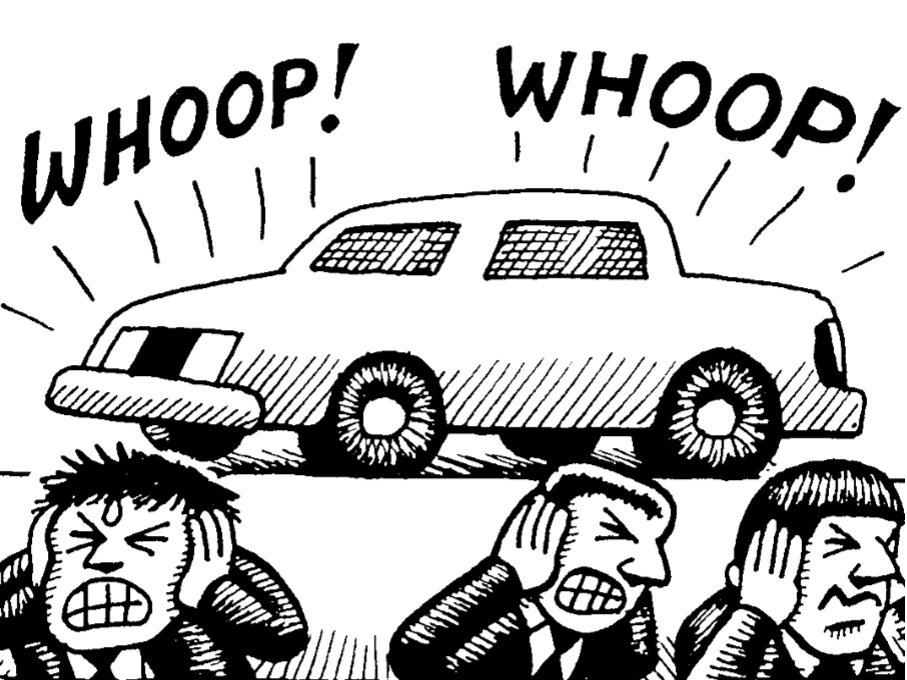|

At the intersection of cars, tech, and noise
__________________________________________________________________
The Life-changing Magic of Letting Go
|

|
|
World Hearing Day 2019 | A month ago, friends sent me links to news that Elon Musk was developing a car alarm signal that would blast classical music when security was breached. I read Musk's tweet and wondered if it was a joke. I couldn't obtain confirmation through Tesla or online, and there were only two articles at the time, so I figured it must be a joke.
Ultimately I decided I didn't care if Tesla used a standard sound, classical music, or the ice cream truck melody. The problem is that Tesla still offers the standard audible alarm. There is a robust array of standard security features in place at this point, and audible alarms are not a gold standard among deterrents: 80% of car thieves can disable an alarm in less than a minute. It's troubling that someone who enjoys a reputation as an innovator and disruptor would use an audible security signal, the epitome of mediocre "establishment" stone age tech.
I also found posts indicating that Tesla alarms cause the same issues that "establishment" automakers' alarms have caused for decades. My reading included a post whose author argues that another car's alarm saved a Tesla car from theft, and shows three people responding to the alarm, even though it's clear the incident was captured on video and viewed in real time. In real life, no audible car alarm has ever elicited this response.
A few days later, I searched online once more for information about the classical music signal. There were more articles, but each copied the original text verbatim. On the other hand, I found yet more security news indicating that Tesla is integrating exterior sensors with filming capability to further bolster security.
Is there no end to the number of methods used to increase security before automakers will trust new tech and let go of audible signals? The audible alarm is no longer a standard option with all cars, and many owners opt not to use it. Many have never used it! In my neighborhood there are thirty-year-old cars parked on the street using only a Club. With newer cars, we've achieved long-awaited dreams in which there are security PINS and dash cams, in which security breaches are reported to call centers and reported to our phones, in which stolen cars are immobilized. If it isn't a joke, it's likely that classical music will add nothing to the security breach scenario beyond amusing Elon Musk and his fan base. At the same time, isn't it likely that additional exterior sensors will increase false alarms?
Rhetorical questions, I'm afraid. If a genuine disruptor doesn't emerge soon and proceed with courage to "let go" of our culture's most useless talisman, the audible car alarm will outlive us all.
I've said this before, but it bears repeating. No detail is too small when it comes to product development, transportation, urban planning, and sound. Virtue signaling only goes so far. If a manufacturer genuinely supports environmental health and sustainability, quiet design should be a fundamental goal.
Permalink
|

|
| |
| |
|
May 20, 2014 |
Since Silence the Horns took over the advocacy and lobbying function of this effort, I've turned the main page of this site into a blog. So there you have it, and here it is. If you landed here because you were woken up when someone locked their car, or you miss being able to sleep with the windows open, or you're tired of hearing horns honking from a block away every few minutes on your otherwise quiet street, you've reached the right place. You can do something about it. And you can begin now, or you can begin later. This is not a minor annoyance. It's a sleep depriver and an attention stealer and a safety risk in parking lots and it's a misuse of a safety signal. You can start anywhere, but I'd suggest you start here.
|
|
|
|